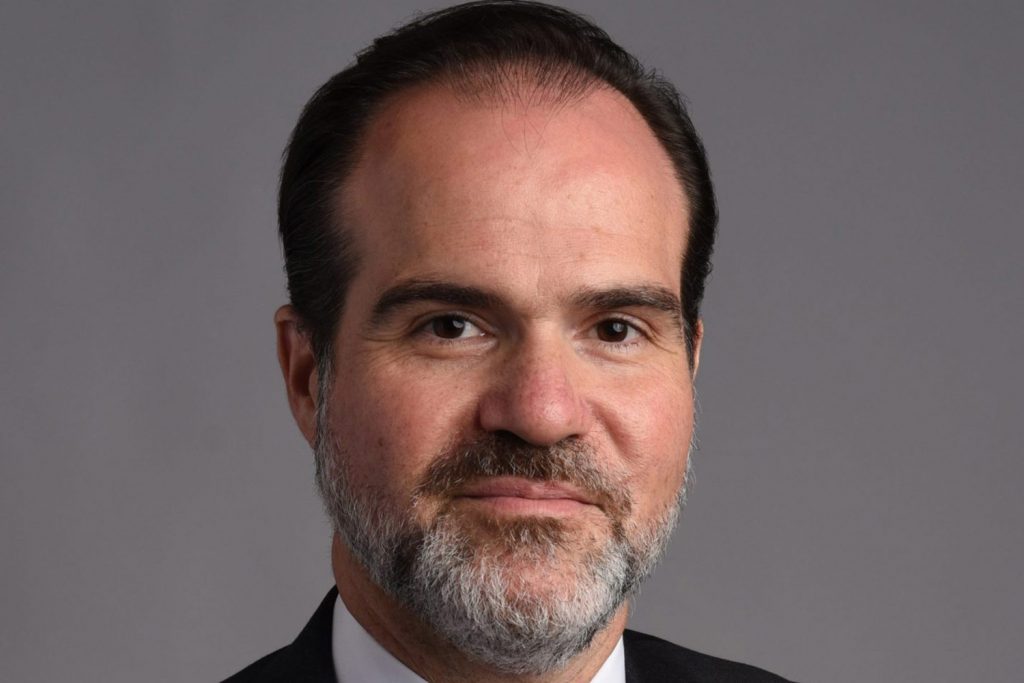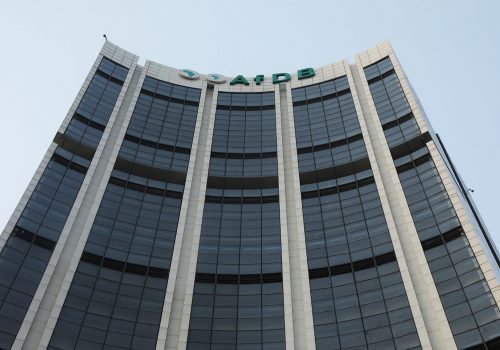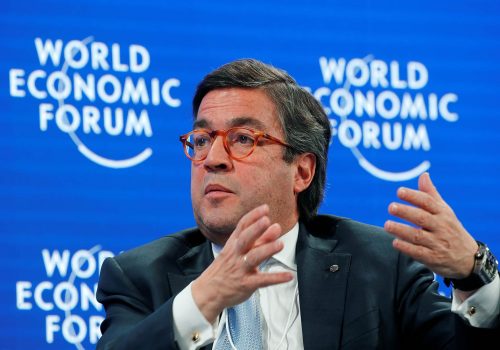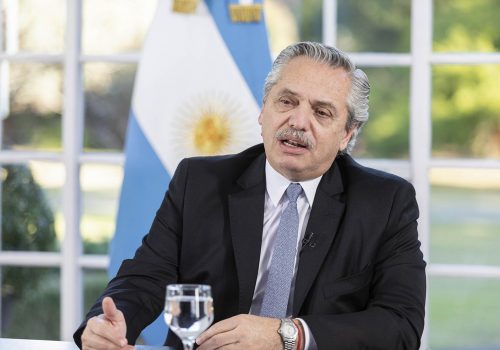Mauricio Claver-Carone, the first US citizen to lead the Inter-American Development Bank (IDB) in its sixty-one-year history, highlighted the importance of additional IDB assistance for Latin America and the Caribbean as the region confronts the enormous challenges posed by the COVID-19 pandemic and its resulting economic upheaval, with US support central to this cause.
Claver-Carone took over October 1 as IDB president from Colombia’s Luis Alberto Moreno, who had led the Washington-based institution for the past fifteen years. He spoke to Jason Marczak, director of the Atlantic Council’s Adrienne Arsht Latin America Center, in a November 23 Atlantic Council Front Page event.
Claver-Carone has previously said the region will need $20 billion to $25 billion annually in lending to recover from this crisis, as economists predict that Latin America and the Caribbean will see an 8 percent drop in gross domestic product (GDP) this year. Along with COVID-19, the region has suffered more than its share of natural disasters; this year alone, four hurricanes slammed into Central America. On top of that, Venezuela’s migration crisis now rivals Syria’s as the worst in the world—yet the international community has so far donated only $125 per Venezuelan refugee, compared to $1,500 per refugee during the height of Syria’s civil war.
Here’s a quick look at what Claver-Carone said about some of the region’s major threats—as well as opportunities—in the years ahead, and the IDB’s role at a critical time for Latin America and the Caribbean.
Major challenges and opportunities ahead
- Bring supply chains closer to home. Nearshoring, in which companies outsource work to facilities that are less expensive and geographically closer (as opposed to offshoring), represents a shot in the arm of up to $80 billion for Latin America and the Caribbean, Claver-Carone suggested, noting that companies are looking to bring their supply chains closer to home. Automaker Ford recently announced it would open a car factory in Uruguay, employing 2,000 people; that expansion was originally supposed to take place in Turkey. Claver-Carone said the IDB will soon host a dialogue with major US companies to explain the opportunities nearshoring offers them in Latin America and the Caribbean. “There’s nothing else out there right now that in the short term would have a greater impact on people’s lives than job creation…Think about the development impact,” he said. “You can do strategic nearshoring in underdeveloped areas where vulnerable populations exist.”
- Improving connectivity. The IDB has said 77 million people throughout the region, especially in rural areas, have no Internet access—a prerequisite to be able to compete in today’s economy. “Digitalization is the labor mobility market access flexibilization of the twenty-first century. It is very difficult for people…to pick up and move their family…but now they have the ability to telework and sell products online. But you can’t do that if you don’t have connectivity,” the IDB chief said, noting a 10 percent jump in connectivity translates to a 3.5 percent GDP increase over two to three years.
- Harnessing creative talent: The so-called “orange economy,” a term coined by Colombian President Iván Duque when he was at the IDB, refers to all sectors whose goods and services are based on intellectual property: visual and performing arts, film, design, publishing, advertising, music, entertainment, and video games, to name a few. “The talent in the region…in regards to the creative sector [is] huge…My dream is that within the next five years, I want the Latin Grammys to be held for the first time in Latin America and the Caribbean,” he said, adding: “There’s nothing worse than seeing that apple, hanging from the tree, so juicy, and it’s right there, and you just want to jump out and eat it. And that’s what we have to do.”
Watch the full event
Role and plans for the IDB
- Pushing for a capital increase. Noting that the IDB does not have a climate facility, Claver-Carone said the climate emergency is a “great reason” to raise more capital—especially since this is also a priority of the incoming Biden administration. Since 2010, the IDB has not raised its annual lending capacity of $11-12 billion; Claver-Carone hopes to boost that to around $20 billion—a move that will require the US Congress and the legislatures of other member states to contribute additional funds. “When you do a capital increase, you’re investing in an institution that is lending and you’re going to get your money back…There is no greater investment during this historic time of crisis than investing in the IDB…It’s consistent with the original intent of the IDB, and we now have an opportunity to do so in a bipartisan fashion,” he said, adding that “by 2025, when my term is over, if we can say ‘hey, we didn’t have another lost decade in Latin America,’ then guess what, we did something good.”
- Better branding. Claver-Carone said the bank, which in 2019 approved $11.3 billion in loans, will “take more risks” under his presidency than it has in the past. The key, he said, is “letting the people in the region…know what the IDB does for them, how it helps them…I think there’s been a stale branding of the IDB. They think about 20th-century big infrastructure projects, essentially a place that is composed of former government officials from throughout Latin America. But the IDB has such a dynamic team wanting to do so much more.”
- Focusing on the right kind of PPPs: Claver-Carone said he wants to “keep the politics” out of his new job. “The cohesive, cooperative success of us…here is going to be based on PPPs, but on the right PPPs: public-private partnerships. If we focus on that, we’re going to win. If we focus on power, patronage, and politics, we’re going to lose.”
- Working with IDB members. The lawyer and former lobbyist, whose candidacy was endorsed by the United States as well as IDB member states Guyana, Haiti, El Salvador, Paraguay, and Israel, said “Ultimately, twenty-three out of twenty-eight countries in the region voted for me…What it shows is a desire for the United States to have a greater footprint not only in the institution but in the region,” he said. As for the 30 percent of countries that abstained, he said, “we’ve crossed those bridges, we’ve gotten through it. I understand their priorities. I think we share a sense of purpose. I want to work toward consensus.”
- Working with the Biden administration. Claver-Carone also stressed the importance of being able to “speak as one voice” in the wake of Joe Biden’s election as president. “I have a deep devotion for the rule of law and democracy,” said Claver-Carone, “There’s a lot of skepticism, we saw in Florida and elsewhere, in regards to Latin American communities [and] the direction of the new administration…If we don’t work together to move past those issues…then we’re missing a huge opportunity.”
- Greater US involvement. “People feel that for the first time since its creation, the United States actually cares about the IDB,” Claver-Carone argued. “I joked that over the last sixty days of the campaign for the [IDB] presidency, the IDB has gotten more attention than it has in the previous sixty years.” Claver-Carone was previously US executive director at the International Monetary Fund (IMF), and served the Trump administration as senior director for Western Hemisphere affairs at the National Security Council. In particular, Claver-Carone also cautioned against China, which became an important lender to the region. “The region wants the United States to step up. They want the IDB to step up. We are their preferred partners….If not, that’s going to be filled elsewhere.”
Larry Luxner is a Tel Aviv-based freelance journalist and photographer who covers the Middle East, Eurasia, Africa, and Latin America. Follow him on Twitter @LLuxner.
Further reading
Image: Mauricio Claver-Carone, president of the Inter-American Development Bank



